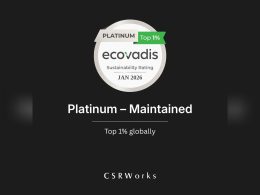Organisations across various industries are increasingly engaging with Microsoft to explore opportunities for advancing sustainability initiatives and reducing carbon emissions throughout their value chains. In response to this demand, Microsoft has released the “Leader’s Guide to Sustainable Business Transformation,” which distills valuable insights from its experiences, as well as those of its global network of partners and customers, and advice from external sustainability experts. This guide provides actionable tips for business leaders on how to cultivate a culture and infrastructure centered around ESG data, alongside context for completing the Microsoft ESG Data Readiness Assessment.
Microsoft’s sustainability journey has highlighted the necessity of integrating ESG considerations into core business operations rather than confining them to isolated reporting efforts. The guide outlines strategies for operational shifts, emphasiing the importance of fostering cross-functional dialogues within organizations about the value of leveraging ESG data.
The guide also illustrates how various Microsoft customers are implementing sustainability solutions to transform their operations. For instance, the international forestry company Södra previously relied on a labour-intensive process confined to its sustainability unit for answering routine inquiries about environmental data. After adopting Microsoft Sustainability Manager in 2023, Södra’s IT and sustainability teams have produced valuable insights for stakeholders, estimating that their positive climate impact equals approximately one-fifth of Sweden’s reported carbon dioxide emissions.
By establishing a robust ESG data infrastructure, organisations can swiftly respond to sustainability-driven market demands while gaining valuable insights. Microsoft’s early sustainability journey underscored the need for improved tools to manage the growing complexity of ESG datasets. The company aimed to unify siloed data and ensure traceability and transparency, preparing for evolving sustainability reporting requirements and identifying opportunities for enhanced sustainability and business growth.
This realisation led Microsoft to implement Microsoft Fabric and AI tools built on Microsoft Azure, integrating ESG, operational, and financial data. This integration empowers employees with timely data intelligence, fostering innovation and idea generation.
However, achieving its ambitious sustainability commitments requires driving change across the value chain. In 2023, Microsoft estimated that over 75% of its carbon footprint stemmed from indirect, or Scope 3 emissions, originating from suppliers. To tackle this challenge, the Microsoft Procurement team sought customised ESG inquiries, granular data, and flexible reporting. The team collaborated with Microsoft engineers to enhance their data technologies with low-code customisation and self-service features, enabling value-chain partners to find ways to minimise their environmental impact.
These comprehensive solutions have been shared with customers, including US agricultural leader Land O’Lakes, which utilises Azure Data Manager for Agriculture to collect and unify data on weather, soil, and irrigation. This capability allows Land O’Lakes’ data scientists to optimise planting decisions while the Azure-based ESG data infrastructure enhances the company’s competitive edge by providing consumers with visibility into its farming practices and environmental outcomes.
















